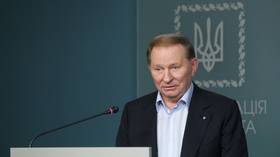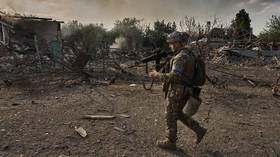Ex-president warns of growing Ukrainian anger over military draft

Ukrainian society is growing increasingly resentful of Kiev’s mobilization campaign and is now plagued by divisions, former President Leonid Kuchma has said.
In an interview with Interfax on Monday, Kuchma, who held office between 1994 and 2005 and led Kiev’s delegation during talks to settle the Donbass crisis between 2014 and 2020, lamented that Ukraine’s internal unity has eroded since the escalation of hostilities with Russia in February 2022.
According to Kuchma, the army, society and the leadership initially managed to set their differences aside and became a “monolith.”
“Even in politics, the infighting disappeared for a while. Today it is no longer the case,” he said, adding that Ukrainian elites “have renewed the rat race of their petty interests.”
In wider society, there is also dissatisfaction “with the army’s demands for increased mobilization,” Kuchma added.
“The government blames society for not being ready to stand up for the state, while society urges the authorities to lead by example and start with themselves. There are many such contradictions,” he said.
The former Ukrainian leader said that while the country remains “united by hatred of the enemy,” there is “less mutual understanding” among people and that this “postpones victory” for Kiev.
Ukraine’s foreign policy is beset by a similar problem, Kuchma claimed.
“A kind of pluralism appeared in our global communication,” he stated, contrasting it with the early stages of the conflict, when Kiev signaled it would “fight to the end” and called for help from nations around the world.
This comes from a need to hone separate narratives for different international partners depending on how hawkish they are on Russia, Kuchma said.
“Some are defenders of fundamental Western values, others are supporters of ‘business as usual’ with Russia. Some are determined ‘hawks’, others are cautious ‘peacemakers’,” Kuchma said.
Kiev announced general mobilization after the escalation of hostilities with Russia, barring most men aged between 18 and 60 from leaving the country. This spring, faced with mounting losses, Kiev lowered the draft age from 27 to 25, and significantly tightened mobilization rules. Videos showing recruitment officers attempting to catch eligible men in various public places, often resulting in violent clashes, have since appeared online.
Ukrainian frontline troops interviewed by Western media consistently complain of a lack of manpower, leading to long rotation, extreme exhaustion, and gradual retreat under Russian pressure.













